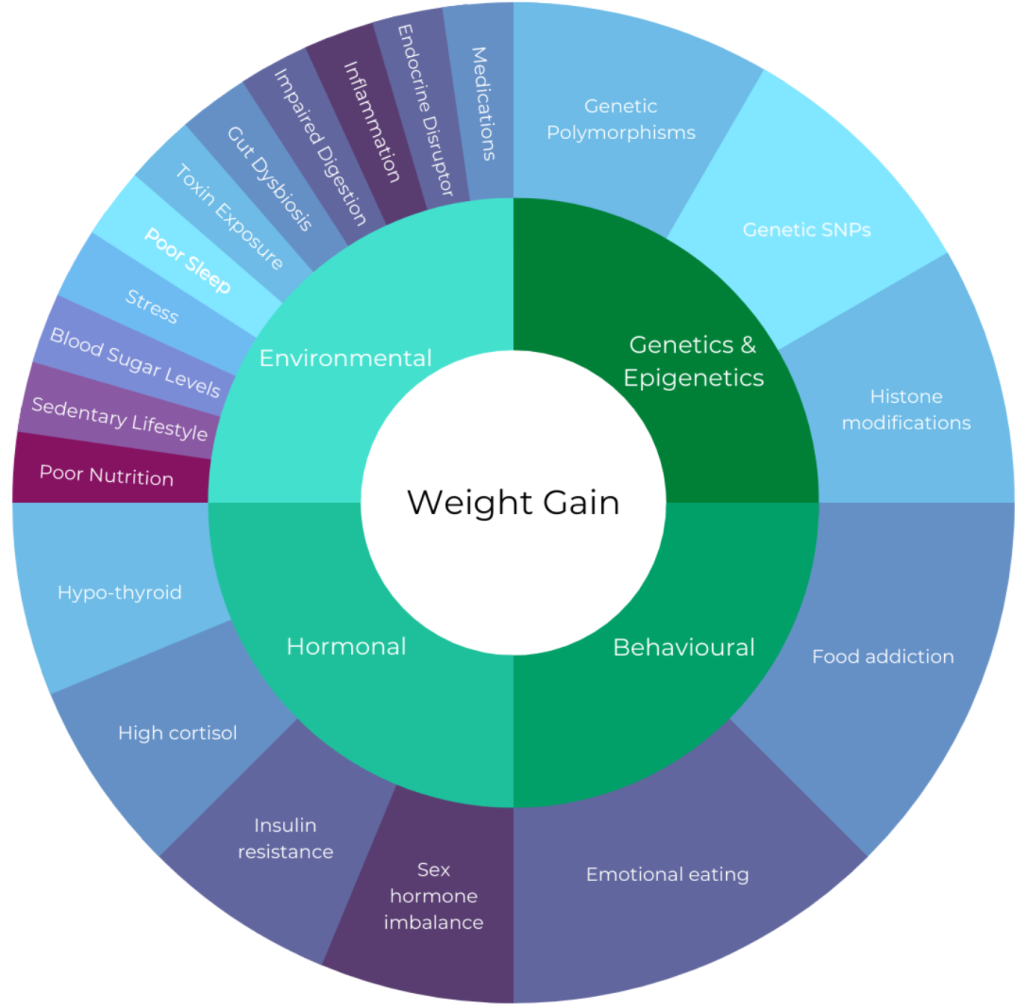Nutritional Therapy & Functional Medicine
Nutritional Therapy To Improve Health & Wellbeing
Nutritional therapy is a personalised approach to healthcare that focuses on the importance of nutrition and lifestyle practices for health optimisation and wellbeing.
It acknowledges that the root cause of undesirable health outcomes is multifactorial and the result of underlying imbalances in our biological systems.
Nutritional therapists will guide you through making sustainable changes to your diet and lifestyle that target existing imbalances and nourish your body.
They will help you find a new rhythm to eating and managing your lifestyle in a way that meets your health needs and helps you achieve your health goals.
Sue Camp, Head of Clinical Nutrition, explains how nutritional therapy and functional medicine can help you feel better, and support your body to lose weight.
Let us Explain how we can help you
Speak with our friendly patient concierge team, and let us answer any questions you have about weight loss surgery
A Functional Medicine Approach To Weight Loss
Functional Medicine is an approach used within Nutritional therapy, which looks to manage chronic conditions and restore individuals to optimal health.
Functional Medicine practitioners map out symptoms under a functional medicine matrix in order to understand which body systems are being challenged. They also identify key factors over your lifetime that may have triggered symptoms or may be contributing to ongoing dysfunction.
Consideration of your diet, environment, and lifestyle choices helps functional medicine practitioners to implement personalised nutrition plans that lead to improved health outcomes.
The Functional Medicine approach helps you to achieve successful and sustainable weight loss, as it draws on interactions between biological systems that impact your metabolism.
The human body has an inbuilt regulatory system that responds to digestive, sensory, physiological, and psychosocial signals and modulates the sensations of appetite and food intake accordingly.
It is crucial to look at the numerous pathways within this system that can adjust our metabolic responses, including communication between our nervous system, gut, fat tissue and other endocrine tissues.

Health & Weight Management
Weight loss often proves difficult when obesity is thought of as an isolated health condition.
Individuals are more susceptible to weight gain if there are imbalances within their biological systems, and this dysfunction results in an array of health symptoms.
Therefore, addressing and managing health symptoms, with the goal of reversing dysfunction, is a crucial way of supporting and elevating weight loss, often leading to long-lasting weight loss results and breaking the cycle of being stuck in obesity.
Click on the + sign below to see how Nutritional Therapists can improve your health and support weight loss and weight management.
Digestive Health
The digestive system is involved in the wider functioning of our body and also houses our gut microbiome, a complex ‘superorganism’ that supports the optimal function of our metabolism.
The majority of digestive conditions have inflammatory and immune system imbalances at their core, which can have detrimental effects on our metabolism.
Weight gain and inflammation go hand in hand, therefore addressing digestive health often leads to successful weight loss.
Hormone Imbalance
The endocrine system and its hormonal secretions is a key consideration when tackling weight loss. There are many different hormones that play an important role in regulating energy intake and expenditure, as well as influencing how we store body fat.
When our stress levels are high, excess amounts of the stress hormone cortisol are produced, which increases our appetite.
It also affects the way our bodies deposit fat, increasing more visceral fat storage around our waistline which puts us at a higher risk of developing further health conditions.
Imbalances in our levels of sex hormones can lead to blood sugar imbalances and insulin resistance, which puts us at an increased risk of gaining weight.
Thyroid Function
The thyroid gland is part of the body’s hormonal system and has the crucial role of releasing hormones that regulate metabolism. Thyroid hormones affect your weight by acting in the brain to regulate food intake and energy expenditure.
An underactive thyroid, also known as hypothyroidism, can cause unexplained weight gain and make it challenging to lose weight.
Addressing other symptoms that accompany hypothyroidism, such as cold intolerance, excessive fatigue and headaches, is often accompanied with weight loss that is longer-lasting and sustainable.
Menopause
During and after menopause, muscle mass reduces and eating the same amount of calories may lead to gradual weight gain.
Hormonal changes in the body include a reduction in levels of oestrogen, which can affect how the body metabolises food and can cause a very stubborn type of weight gain.
Addressing these hormonal balances, as well as other bodily changes can help prevent further weight gain and improve weight loss, especially around the abdomen.
LET US EXPLAIN HOW WE CAN HELP YOU
Speak with our friendly patient concierge team, and let us answer any questions you have about weight loss surgery.
Finding Balance In Your Body After Bariatric Surgery
Bariatric surgery puts you under huge amounts of stress, and some people may experience changes within their body systems such as:
- The way your body absorbs nutrients from food
- Digestive issues
- Nutrient deficiencies
- Hormonal irregularities
Nutritional Therapists and the functional medicine approach can support you through any struggles you have after bariatric surgery.
The focus will be on helping you regain a balance in your diet and lifestyle in a way that meets the changing requirements of your shrinking body and weight.
Understanding your activity levels and changes in body mass will enable us to continually update your nutritional needs, which means your weight loss will be steady and safe.
Functional Testing
Functional testing provides valuable information about the way your biochemistry may be impacting your health and your ability to manage your weight.
It allows practitioners to understand where physiological imbalances may be contributing to weight gain and the development of chronic conditions.
Functional testing will shed light on potential barriers to your weight loss and with expert support from your functional medicine practitioner, will help you implement changes that lead to long-lasting weight loss.
We recommend functional testing investigations between three and six months post-surgery, to support you in achieving the best weight loss surgery outcomes, and optimal health and wellness.
What Can You Test For?
Functional Testing can give a detailed insight into how well your hormones and other key metabolic markers are functioning. Some examples of useful tests include:
One of the most comprehensive hormone profiles available is the DUTCH Profile which utilises a urine sample to look at hormone pathways and the metabolites – how the body has processed hormones through the liver. The results from the DUTCH Profile provide a detailed insight into the metabolism and excretion of hormones, helping to identify the root causes of sex hormone and adrenal imbalances in both women and men. It can therefore provide insight into weight gain in men and women.
The GI Effects Stool Profiles offers comprehensive insight into the 3 key functions of gut health:
- Digestive function (Digestion/Absorption)
- Intestinal inflammation (inflammation/Immunology)
- The Gut Microbiome
The metabolic activities of the microbiome ultimately impact the human host, therefore this profile provides important information about the potential root causes of weight issues including difficulty with weight loss.
Some of the profiles we use include the following:
| IMBALANCES | TEST PROFILE |
| Digestive Dysfunction | GI Comprehensive Stool Profile |
| Health Assessment | Functional DX Blood Profiles |
| Nutrient Assessment | Metabolomix Profile |
| Hormone Assessment | DUTCH Complete Profile |
| Thyroid Function | Thyroid Advanced Profile |
| Stress Response | Adrenal Stress Profile |

